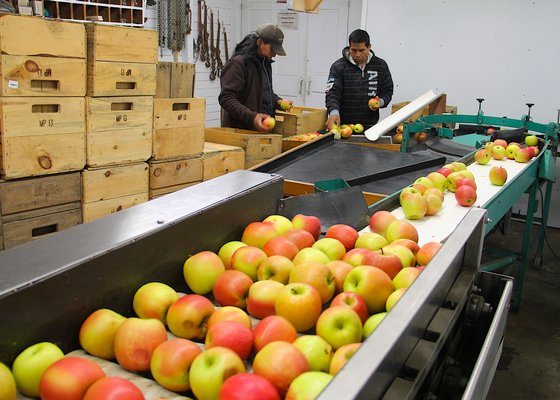
After weathering increased land costs, rapid development and heightened regulation, South Fork farmers are predicting the end of their industry in light of Governor Andrew Cuomo’s proposed $15 minimum wage.
Part of the governor’s campaign for economic justice, the statewide minimum wage, now set at $9 per hour as opposed to the federal minimum of $7, would increase gradually according to a budget agreement reached this week. In Suffolk and Nassau counties, it would climb to $15 per hour by 2021.
The minimum wage, which we raised in the state of New York … $18,000 a year—you can’t live on $18,000 a year," the governor said during a "Drive for $15" rally earlier this year to promote the increase, adding that the new economy was removing opportunity and mobility for a large number of people while only a small portion were accumulating wealth. "You do the math, it does not work," Mr. Cuomo said. "You can’t pay rent, clothing, food, expenses for $18,000 a year."
“If this is passed, the farm industry is through,” said Dean Foster, prior to the agreement. A sixth-generation farmer, he has recently branched out from selling wholesale potatoes to establishing a farm-based distillery for liquor products. He cited the lack of profitability in commodity crops as one reason why he moved away from exclusively farming potatoes.
Given last year’s food prices, Mr. Foster said that if he had to pay all his workers $15 an hour, he would not have harvested his potatoes in 2015.
“The only way we could pay $15 minimum wage to farm laborers is if potatoes sold for 25 to 30 cents a pound,” he explained. He sells his potatoes wholesale for 9.5 cents to 13 cents a pound to stores that then sell them for around $1 pound. Free trade agreements work to keep prices low for potatoes like the Irish Round or the North East, which further discourages South Fork farmers from growing wholesale crops.
“The potato industry that I’m involved in is so close to folding up,” Mr. Foster said.
“Farmers can’t raise their prices because the cost of doing business goes up,” said Bob Carpenter, administrative director at the Long Island Farm Bureau. He believes the new minimum wage will significantly erode profit margins for farmers.
Some say the minimum wage agreement comes at a difficult time for farmers in New York State, who are already struggling to compete with producers in the Midwest and abroad. According to Farm Credit East, a farmer-owned financial cooperative, of approximately 10,000 farms in New York State that hire employees, 13 to 19 percent would cease to be profitable if the minimum wage rises to $15 per hour.
Producers from greater Suffolk County report paying their skilled workers an average of $12 or $11 an hour, but on the South Fork most farmers claim to already be paying their skilled workers an average of $15, given the higher cost of living.
“Our fear of what will happen is that if minimum wage goes to $15—will other wages got to $21?” Mr. Carpenter said of the pay for skilled workers. He compares this phenomenon to a “rising tide for boats.”
Farm Credit East estimates that the biggest impact will be on dairy, fruit and vegetable farms, as well as greenhouses and nurseries, as agricultural industries that are relatively labor-reliant.
“This could cause more damage than good,” said Jenn Halsey of the Milk Pail in Water Mill. “I understand where they are coming from … people need to make more money," she said. "But then things will start costing more.”
Ms. Halsey estimated that she pays skilled farm workers at least $15 an hour, and like Mr. Carpenter fears that if minimum wage rises to $15, she will need to pay skilled workers at least $21 an hour. “We are already getting people telling us that our apples are expensive,” she said.
“This will only ruin it for children who are getting their first job,” said Richie King of North Sea Farms, meaning that farmers will be forced to hire fewer unskilled high school workers.
Operating on a relatively small parcel of 10 acres, Mr. King is not as reliant on outside labor as some other farmers. But the increase will still result in a large price increase for his products, from $6 to $7 for a carton of eggs alone, he estimates.
“This would be 100 percent more devastating than any good [Mr. Cuomo] has done,” for the farm industry, said Bob Nolan, a vegetable farmer in Brookhaven who is the Long Island representative on the New York Farm Bureau Board. “It is not based on economics, it’s on politics.”
Describing the increase as “not feasible,” Mr. Nolan expects the impact to be felt more on the North Fork and in greater Suffolk County than on the South Fork, however, where many farmers already pay $15 an hour.
“Farmers on Long Island will be paying $6 more for labor than [other] states,” said Mr. Carpenter. “It will really hurt farmers.”
"